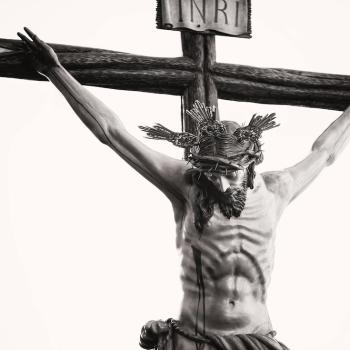When Catherine De Hueck first arrived in New York City, she recalled, "the actual sight was simply overwhelming." Then, she writes, she "did the strangest thing." Standing outside Grand Central Station, she "looked at the immensity of New York, and said out loud, 'You do not frighten me . . . I'll conquer you.'" A nearby policeman said: "Atta girl!"
An impoverished Russian aristocrat, she took a variety of jobs: laundress, waitress, cashier at Macy's, personal trainer. It was a lonely time: "There is no greater loneliness than being in a crowd of people you don't know." At one restaurant, she soon discovered she was expected to provide additional services to male customers. She changed her uniform, threw it at her boss, and said: "I am not porno material!"
Born Catherine Kolyschkine in 1896, she grew up in the aristocratic privilege of Czarist Russia. She traveled throughout Europe with her parents. At fifteen, she was married to her cousin, Baron Boris De Hueck, an arranged marriage. During World War I, they both served in the army, he an officer and she a nurse. She was decorated for bravery under fire.
As Russia collapsed, they returned to St. Petersburg, where they found "nothing to eat." Forced to rummage through garbage cans, they were attacked as "aristocrats." They escaped from Russia, hiding along the way in pig sties. Westerners, she insisted, couldn't understand real starvation, "never having really experienced its complete absence."
Finding refuge in England, she was received into the Catholic Church. Raised Orthodox, she had been taught by Catholic nuns at an early age. From there, she and Boris made their way to Canada, where the two would eventually divorce. In New York, she sought work, not a cause. A lecture bureau asked her to speak on pre-revolutionary Russia, with a handsome salary. Then, all of a sudden it seemed, she gave it up to go live with the poor in the middle of the Great Depression:
During those days I was in the throes of hearing the Lord say, "Sell what you possess . . . come follow me," and I was running away from him. One night, while dancing with this man, I heard laughter, a very gentle and kind laughter. I heard what I thought was the voice of God laughing and saying: "You can't escape me, Catherine, you can't." I pleaded a headache and went home. Some new phase of my life was about to begin.
She began her work in Canada and came back to New York. Two things shocked her: the extent of white racism, and living conditions in Harlem. At Columbia University, she asked a professor why African-Americans weren't discussed. He responded: "Oh, we don't study the Negro. We study American history." The United States, she wrote, "had this marvelous Constitution, but it doesn't apply to Negroes."
In Harlem, she found "a no-man's land of fear and doubt." Where was God in it all? she asked. In 1938, she founded Friendship House, an interracial apostolate dedicated to fighting segregation. Like her friend Dorothy Day, the "B." (the Baroness) as they called her, attracted idealistic young people nationwide. One volunteer recalled:
White people, black people—talking, laughing, friendly, sipping coffee. How simple the solution all seemed then: the sooner we of different races learned to work together, to pray together, to eat, to study, to laugh together, the sooner we'd be on the way to interracial justice.
Advocating Civil Rights could be as deadly as revolutionary Russia. She was spit at and called a "nigger lover." At a Catholic women's group, she was berated for eating "with dirty niggers." When a woman told her, "You smell of the Negro," Catherine lost her temper: "And you stink of hell!" Once at a lecture in Savannah, she was nearly beaten to death by a group of white Catholic women.
"You have to preach the Gospel," Catherine said, "without compromise or shut up. One or the other. I tried to preach it without compromise." She always ended her lectures the same way:
Sooner or later, all of us are going to die. We will appear before God for judgment. The Lord will look at us and say, "I was naked and you didn't clothe me. I was hungry and you didn't give me anything to eat. I was thirsty and you didn't give me a drink. I was sick and you didn't nurse me. I was in prison and you didn't come to visit me." And we shall say, "Lord, when did I not do these things?" I would stop here, pause, and in a very loud voice say, "When I was a Negro and you were a white American Catholic." That's when the rotten eggs and tomatoes would start to fly!
One of her key supporters was New York's Cardinal Patrick J. Hayes, who was "always worried" about her. After she organized a study group at Friendship House, the local pastor visited her:
"Listen to me, you Russian nitwit. What are you trying to do? Make them think they are loved just because they have become Catholics? You are giving them the raw Gospel and it isn't getting you anywhere. Stop it!" I said, "Father, would you like to come with me to see the Cardinal? If he orders me to stop, I will stop." "Oh, hell," he said. On the way out he slammed the door and smashed the glass in the window."
Later Catherine would remarry and move back to Canada, where she continued to be involved in apostolic work. But wherever she worked, she sought to actualize the Gospel message in the present moment. As she once told a Fordham University Jesuit: "I have never read anywhere in the gospel where Christ says to wait twenty years before living the gospel. The Good News is for now."
12/2/2022 9:05:40 PM





